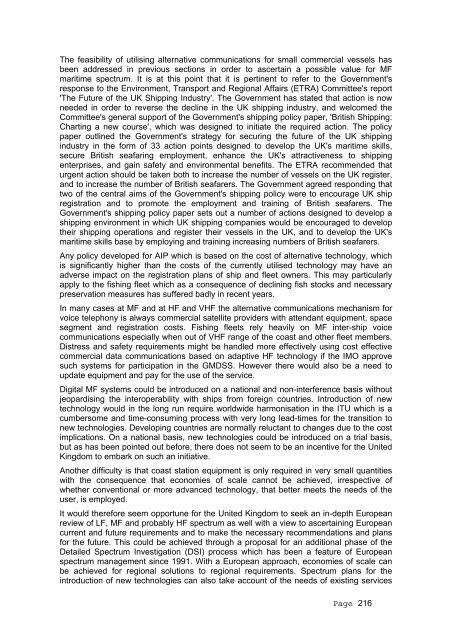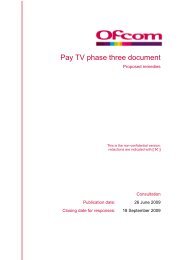FINAL REPORT - Stakeholders - Ofcom
FINAL REPORT - Stakeholders - Ofcom
FINAL REPORT - Stakeholders - Ofcom
Create successful ePaper yourself
Turn your PDF publications into a flip-book with our unique Google optimized e-Paper software.
The feasibility of utilising alternative communications for small commercial vessels has<br />
been addressed in previous sections in order to ascertain a possible value for MF<br />
maritime spectrum. It is at this point that it is pertinent to refer to the Government's<br />
response to the Environment, Transport and Regional Affairs (ETRA) Committee's report<br />
'The Future of the UK Shipping Industry'. The Government has stated that action is now<br />
needed in order to reverse the decline in the UK shipping industry, and welcomed the<br />
Committee's general support of the Government's shipping policy paper, 'British Shipping:<br />
Charting a new course', which was designed to initiate the required action. The policy<br />
paper outlined the Government's strategy for securing the future of the UK shipping<br />
industry in the form of 33 action points designed to develop the UK's maritime skills,<br />
secure British seafaring employment, enhance the UK's attractiveness to shipping<br />
enterprises, and gain safety and environmental benefits. The ETRA recommended that<br />
urgent action should be taken both to increase the number of vessels on the UK register,<br />
and to increase the number of British seafarers. The Government agreed responding that<br />
two of the central aims of the Government's shipping policy were to encourage UK ship<br />
registration and to promote the employment and training of British seafarers. The<br />
Government's shipping policy paper sets out a number of actions designed to develop a<br />
shipping environment in which UK shipping companies would be encouraged to develop<br />
their shipping operations and register their vessels in the UK, and to develop the UK's<br />
maritime skills base by employing and training increasing numbers of British seafarers.<br />
Any policy developed for AIP which is based on the cost of alternative technology, which<br />
is significantly higher than the costs of the currently utilised technology may have an<br />
adverse impact on the registration plans of ship and fleet owners. This may particularly<br />
apply to the fishing fleet which as a consequence of declining fish stocks and necessary<br />
preservation measures has suffered badly in recent years.<br />
In many cases at MF and at HF and VHF the alternative communications mechanism for<br />
voice telephony is always commercial satellite providers with attendant equipment, space<br />
segment and registration costs. Fishing fleets rely heavily on MF inter-ship voice<br />
communications especially when out of VHF range of the coast and other fleet members.<br />
Distress and safety requirements might be handled more effectively using cost effective<br />
commercial data communications based on adaptive HF technology if the IMO approve<br />
such systems for participation in the GMDSS. However there would also be a need to<br />
update equipment and pay for the use of the service.<br />
Digital MF systems could be introduced on a national and non-interference basis without<br />
jeopardising the interoperability with ships from foreign countries. Introduction of new<br />
technology would in the long run require worldwide harmonisation in the ITU which is a<br />
cumbersome and time-consuming process with very long lead-times for the transition to<br />
new technologies. Developing countries are normally reluctant to changes due to the cost<br />
implications. On a national basis, new technologies could be introduced on a trial basis,<br />
but as has been pointed out before, there does not seem to be an incentive for the United<br />
Kingdom to embark on such an initiative.<br />
Another difficulty is that coast station equipment is only required in very small quantities<br />
with the consequence that economies of scale cannot be achieved, irrespective of<br />
whether conventional or more advanced technology, that better meets the needs of the<br />
user, is employed.<br />
It would therefore seem opportune for the United Kingdom to seek an in-depth European<br />
review of LF, MF and probably HF spectrum as well with a view to ascertaining European<br />
current and future requirements and to make the necessary recommendations and plans<br />
for the future. This could be achieved through a proposal for an additional phase of the<br />
Detailed Spectrum Investigation (DSI) process which has been a feature of European<br />
spectrum management since 1991. With a European approach, economies of scale can<br />
be achieved for regional solutions to regional requirements. Spectrum plans for the<br />
introduction of new technologies can also take account of the needs of existing services<br />
Page 216
















